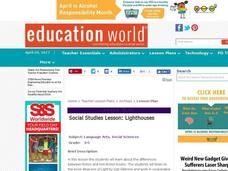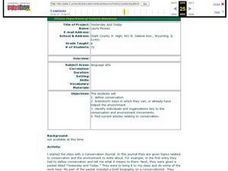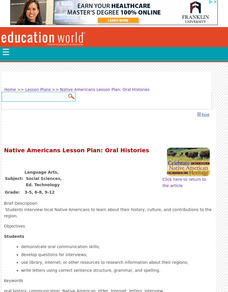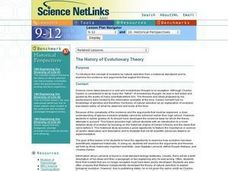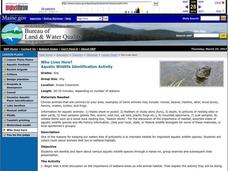Curated OER
Cell 9 Edited: Meiosis
Student list the steps of mitosis with a brief definition of each stage. Then they begin their study of meiosis. They practice placing the stages of meiosis in order using flashcards depicting the Prophase, Metaphase, Anaphase, and...
Curated OER
"Lighthouses"
Learners listen to the book "Beacons of Light" by Gail Gibbons and identify the different characteristics and facts concerning lighthouses and their history. They examine the differences between fiction and non-fiction books and engage...
Curated OER
Let's Learn About Lettuce
Students learn more about lettuce. In this agriculture lesson plan, students listen to their instructor lecture about the history of lettuce. Students then participate in an activity that requires them to compare and contrast iceberg...
Curated OER
This Life Stinks
High schoolers study how organisms that live in cold seep communities get energy from methane. In this organism lesson students write a brief report and identify oxidation reduction reactions and explain if these are dependent of...
Curated OER
Rules and Procedures
Eighth graders complete a brief introduction to the rules and procedures of the class. Through lecture, 8th graders review the rules of the class and the procedures that make the class run smoothly. They participate in a discussion of...
Curated OER
I'm Here, I'm There, I'm Everywhere-I'm Super Spud!
Students generate a computer model of a potato plant. In this potato lesson plan, students study the history of potatoes, the variety of potatoes, the functions of the potato plant parts, and make a potato model on the computer.
Curated OER
Yesterday and Today
Eighth graders are introduced to the concept of conservation. As a class, they brainstorm ways in which they can or already have helped the environment. Using the internet, they research key individuals and organizations that help the...
Curated OER
Oral Histories
Pupils interview local Native Americans to explore their history, culture, and contributions to the region. They contact a local Native American organization, conduct an interview with a volunteer and write thank-you notes.
Curated OER
The History of Evolutionary Theory
Learners are introduced to the concept of evolution by natural selection from a historical standpoint. They examine the evidence and arguments that support the theory of natural selection.
Curated OER
Michigan's Lumbering history: Yesterday, Today, and Tomorrow
Fourth graders explore lumbering in Michigan. For this lumbering lesson, 4th graders examine the life of a modern day lumberjack and how technology can interfere with natural ecology. Students create a list of products from the forest...
Curated OER
Women in Science
Students examine obstacles faced by women throughout the world. They gather ask-an-expert websites, propose leading questions, and communicate with real female scientists.
Curated OER
Periodic History
Learners gain a perspective in the development of chemistry. They understand some of the topics in their text and the ongoing nature of research. They then will be able to see the trends of the periodic table first hand through their own...
Curated OER
An Exploration of Leonardo da Vinci's Life and Work
The original Renaissance man, da Vinci is a wonderful subject through which to discuss history, art and science.
Curated OER
The Wright Brothers on Hollywood Squares
Students test their knowledge of the Wright brothers by playing "Hollywood Squares." They read (or listen) with comprehension. Students follow the rules as they actively participate in a game to test their reading (or listening)...
Curated OER
An Introduction to Microbes - Biology Teaching Thesis
Students are able to define microbes and identify the five main groups of microbes. They are able to give examples of ways in which microbes have impacted or currently impact human life. Students are able to explain that not all microbes...
Curated OER
Understanding the Water Cycle
Investigate the water cycle and how water moves from the land to the air and back to the land. Create a terrarium and observe the water cycle at work. Define weather terms including evaporation, condensation, and precipitation.
Curated OER
Radiation and You
Internet research on nuclear radiation is conducted by young physicists. They discover how our understanding of radiation developed, define vocabulary terms, and explore how ozone protects us from the sun's harmful radiation. Several...
Curated OER
"Two Diamond Baseball" Review Game
Here is a game that can be used across the curriculum. Two teams are made up, and each time a member of the team answers a question correctly, they roll a dice to see how far they advance on the "baseball field." A fun game!
Curated OER
Who Lives Here?
Students identify various aquatic wildlife species. In this biology lesson students collect clues about animals that live in wetland habitats. Students rotate through several stations displaying particular animal species to collect their...
Curated OER
EU Simulation: The European Council
Discover how government and the European Union works with this interactive activity. Small groups form to represent a country and create a profile. The instructor presents an issue to discuss and potential politicians then develop...
Centers for Ocean Sciences
Ocean and Great Lakes Literacy: Principle 7
Your mission, should you choose to accept it, is to take your class on an underwater adventure. The final installment in a seven-part series involving salt and freshwater bodies takes junior oceanographers below the surface in...
Curated OER
Kingdom Animalia ~ A Look at the Five Major Classes
Biological taxonomy masters examine the five main classes under phylum chordata. Pupils compare and contrast the identifying characteristics of the various organisms. They explain why taxonomy is important in classifying organisms. You...
Curated OER
Will the Leaning Tower Fall?
Students research the Tower of Pisa and write a report about its history. They examine the physics of why it leans and whether it might fall. Students plan a trip to Italy to view the Tower. They develop an itinerary and budget for the...
Curated OER
Can You See What I See?
Students gain an understanding of the methods used to explore the earth's surface. Students create a time line leading to the first satellite image of the Earth that includes the various methods utilized to observe the earth's surface.



